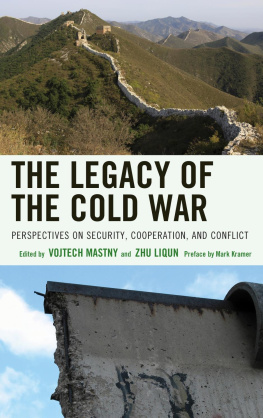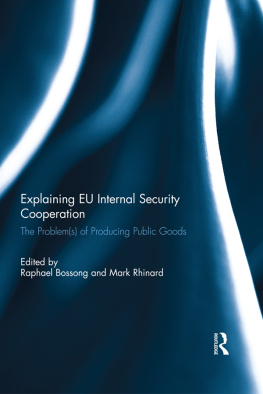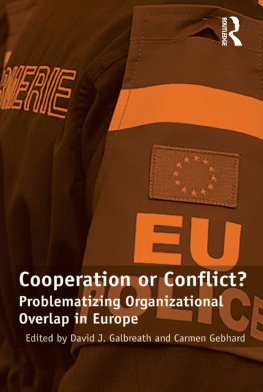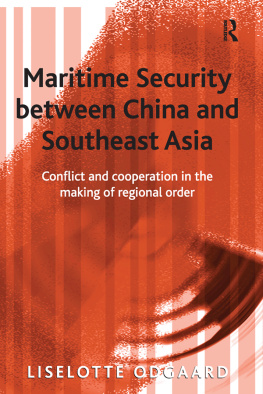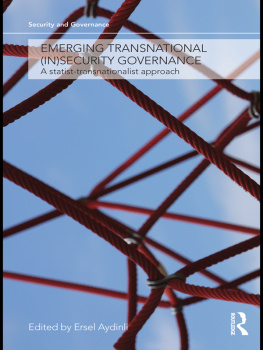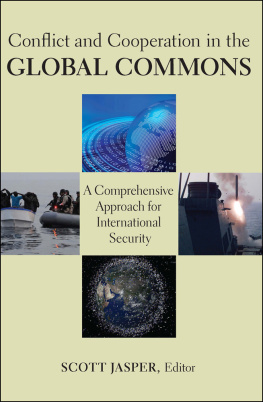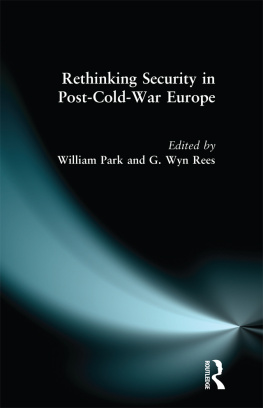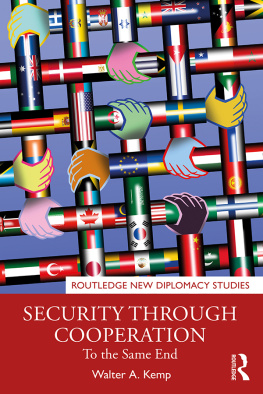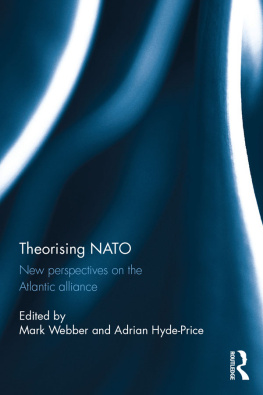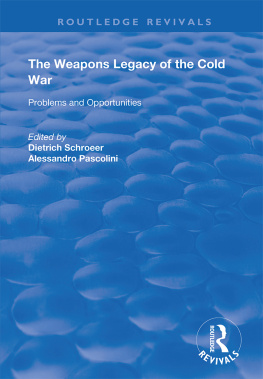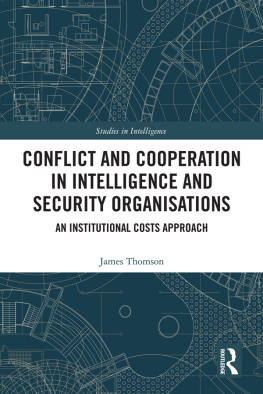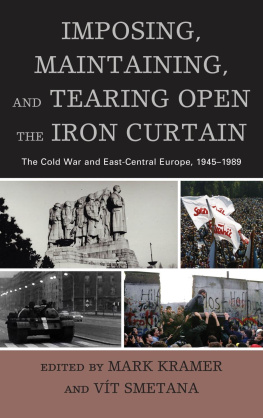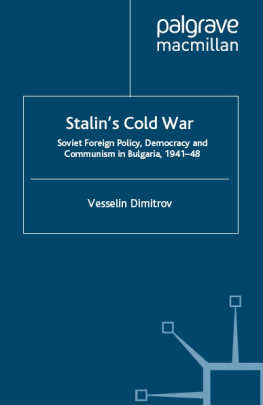Kramer Mark - The legacy of the Cold War: perspectives on security, cooperation, and conflict
Here you can read online Kramer Mark - The legacy of the Cold War: perspectives on security, cooperation, and conflict full text of the book (entire story) in english for free. Download pdf and epub, get meaning, cover and reviews about this ebook. City: Lanham;Maryland, year: 2014;2012, publisher: Lexington Books, genre: Politics. Description of the work, (preface) as well as reviews are available. Best literature library LitArk.com created for fans of good reading and offers a wide selection of genres:
Romance novel
Science fiction
Adventure
Detective
Science
History
Home and family
Prose
Art
Politics
Computer
Non-fiction
Religion
Business
Children
Humor
Choose a favorite category and find really read worthwhile books. Enjoy immersion in the world of imagination, feel the emotions of the characters or learn something new for yourself, make an fascinating discovery.
- Book:The legacy of the Cold War: perspectives on security, cooperation, and conflict
- Author:
- Publisher:Lexington Books
- Genre:
- Year:2014;2012
- City:Lanham;Maryland
- Rating:3 / 5
- Favourites:Add to favourites
- Your mark:
- 60
- 1
- 2
- 3
- 4
- 5
The legacy of the Cold War: perspectives on security, cooperation, and conflict: summary, description and annotation
We offer to read an annotation, description, summary or preface (depends on what the author of the book "The legacy of the Cold War: perspectives on security, cooperation, and conflict" wrote himself). If you haven't found the necessary information about the book — write in the comments, we will try to find it.
Kramer Mark: author's other books
Who wrote The legacy of the Cold War: perspectives on security, cooperation, and conflict? Find out the surname, the name of the author of the book and a list of all author's works by series.
The legacy of the Cold War: perspectives on security, cooperation, and conflict — read online for free the complete book (whole text) full work
Below is the text of the book, divided by pages. System saving the place of the last page read, allows you to conveniently read the book "The legacy of the Cold War: perspectives on security, cooperation, and conflict" online for free, without having to search again every time where you left off. Put a bookmark, and you can go to the page where you finished reading at any time.
Font size:
Interval:
Bookmark:
The Legacy of the Cold War
THE HARVARD COLD WAR STUDIES BOOK SERIES
SERIES EDITOR: Mark Kramer, Harvard University
Redrawing Nations: Ethnic Cleansing in East-Central Europe, 19441948, edited by Philipp Ther and Ana Siljak
Triggering Communisms Collapse: Perceptions and Power in Polands Transition, by Marjorie Castle
The Struggle for the Soul of the Nation: Czech Culture and the Rise of Communism, by Bradley F. Abrams
Resistance with the People: Repression and Resistance in Eastern Germany 19451955, by Gary Bruce
At the Dawn of the Cold War: The Soviet-American Crisis over Iranian Azerbaijan, 19411946, by Jamil Hasanli
The Cold War after Stalins Death: A Missed Opportunity for Peace?, edited by Klaus Larres and Kenneth Osgood
Mao and the Economic Stalinization of China, 19481953, by Hua-yu Li
The Eisenhower Administration, the Third World, and the Globalization of the Cold War, edited by Kathryn C. Statler and Andrew L. Johns
Stalin and the Cold War in Europe: The Emergence and Development of East-West Conflict, 19391953, by Gerhard Wettig
Eisenhower and Adenauer: Alliance Maintenance under Pressure, 19531960, by Steven Brady
The Prague Spring and the Warsaw Pact Invasion of Czechoslovakia in 1968, edited by Gnter Bischof, Stefan Karner, and Peter Ruggenthaler
China Learns from the Soviet Union, 1949Present, edited by Thomas P. Bernstein and Hua-yu Li
Globalizing de Gaulle: International Perspectives on French Foreign Policies, 19581969, edited by Christian Nuenlist, Anna Locher, and Garret Martin
Solidarity with Solidarity: Western European Trade Unions and the Polish Crisis, 19801982, edited by Idesbald Goddeeris
Stalin and the Turkish Crisis of the Cold War, 19451953, by Jamil Hasanli
Securing the Communist State: The Reconstruction of Coercive Institutions in the Soviet Zone of Germany and Romania, 19441948, by Liesbeth van de Grift
Solidarity: The Great Workers Strike of 1980, by Michael Szporer
Imposing, Maintaining, and Tearing Open the Iron Curtain: The Cold War and East-Central Europe, 19451989, edited by Mark Kramer and Vt Smetana
The Legacy of the Cold War
Perspectives on Security, Cooperation, and Conflict
Edited by Vojtech Mastny and Zhu Liqun
LEXINGTON BOOKS
Lanham Boulder New York Toronto Plymouth, UK
Published by Lexington Books
A wholly owned subsidiary of Rowman & Littlefield
4501 Forbes Boulevard, Suite 200, Lanham, Maryland 20706
www.rowman.com
10 Thornbury Road, Plymouth PL6 7PP, United Kingdom
Copyright 2014 by Lexington Books
All rights reserved. No part of this book may be reproduced in any form or by any electronic or mechanical means, including information storage and retrieval systems, without written permission from the publisher, except by a reviewer who may quote passages in a review.
British Library Cataloguing in Publication Information Available
Library of Congress Cataloging-in-Publication Data
The legacy of the Cold War : perspectives on security, cooperation, and conflict / edited by Vojtech Mastny and Zhu Liqun.
pages cm. -- (The Harvard Cold War studies book series)
Includes bibliographical references and index.
ISBN 978-0-7391-8789-0 (cloth : alkaline paper) -- ISBN 978-0-7391-8790-6 (electronic)
1. Cold War--Influence. 2. World politics--1945-1989. 3. National security--History--20th century. 4. Security, International--History--20th century. 5. International cooperation--History--20th century. 6. Military history, Modern--20th century. I. Mastny, Vojtech, 1936- II. Zhu, Liqun.
D843.L324 2014
355.0209'04--dc23
2013041663
 TM The paper used in this publication meets the minimum requirements of American National Standard for Information Sciences Permanence of Paper for Printed Library Materials, ANSI/NISO Z39.48-1992.
TM The paper used in this publication meets the minimum requirements of American National Standard for Information Sciences Permanence of Paper for Printed Library Materials, ANSI/NISO Z39.48-1992.
Printed in the United States of America
Mark Kramer
Previous books in the Harvard Cold War Studies book series have looked at Europe or Asia or North America, but this latest book, edited by Vojtech Mastny and Zhu Liqun, covers Europe and Asia in equal measure. The contributors discuss the alliances and other security arrangements that existed in these regions during the Cold War, and they seek to determine whether the earlier experiences can help us understand key security challenges in Europe and Asia in the twenty-first century.
Political scientists, scholars of international relations, and historians have offered varying explanations of why states form alliances. Kenneth Waltzs structural theory of international relations depicts alliances as a means of external balancing for states, as opposed to the internal balancing of military spending and defense preparations. Waltz argues that states are most inclined to balance against more powerful states, aiming to achieve a balance of power. Stephen Walt has offered a significant modification of Waltzs argument, arguing that states seek alliances against other states they perceive as most threatening, regardless of how powerful they are. Powerful states that are seen as friendly are deemed to be good candidates as allies. For Walt, the dynamic of alliance formation is a balance of threat, not a balance of power, as suggested by Waltz. Walt and Waltz agree, however, that alliances are usually transitory, and both of them predicted in the early 1990s that the North Atlantic Treaty Organization (NATO) would soon cease to exist.
The chapters in this book bear out Walts argument about the balance of threat, but they contravene his (and Waltzs) notion that alliances are inherently evanescent. Not only has NATO continued to exist, it has nearly doubled in size since the end of the Cold War. The U.S. alliances with Japan, South Korea, Australia, and New Zealand have been similar to NATO in their longevity. All these cases suggest that liberal and constructivist theories of international relations, emphasizing the importance of domestic political arrangements and the collective identities of allied leaders, have considerable merit. In addition to serving as a military alliance, NATO gradually evolved into a community of democratic states (a pluralistic security community, as Karl Deutsch called it more than fifty-five years ago), and much the same is true about U.S. alliances with East Asian and Pacific countries. Even though a few of these allies experienced periods of authoritarianism during the Cold War (South Korea, Turkey, and Greece), all U.S. allies in Europe and East Asia in the postCold War era have been democratic, and a democratic polity has been mandatory for all new members of NATO. The alliances that have been most transitory are those between authoritarian states, such as the Soviet Union and China, whose brief fraternal alliance in the 1950s is discussed below.
Larger and more amorphous international bodies, such as the United Nations and the Conference on Security and Cooperation in Europe (CSCE), both of which are covered in chapters here, have never been effective as collective security mechanisms. The UN and CSCE (which in 1992 was renamed the Organization for Security and Cooperation in Europe, or OSCE) have had a role in peace-keeping operations and sundry nonmilitary activities, but neither the UN nor the OSCE is a substitute for the alliances and other security arrangements sponsored by the United States in both Europe and East Asia. Some fledgling regional security institutions in East Asia and the Pacific may eventually reduce the importance of the U.S. alliances there (and perhaps ultimately replace them altogether), but that seems unlikely in the near future. Only if the regional institutions become robust and reliable, and acquire effective military content will the raison dtre of the U.S. alliances come into question. Until then, U.S. allies in East Asia and the Pacific will undoubtedly be averse to changing their security relations with the United States.
Next pageFont size:
Interval:
Bookmark:
Similar books «The legacy of the Cold War: perspectives on security, cooperation, and conflict»
Look at similar books to The legacy of the Cold War: perspectives on security, cooperation, and conflict. We have selected literature similar in name and meaning in the hope of providing readers with more options to find new, interesting, not yet read works.
Discussion, reviews of the book The legacy of the Cold War: perspectives on security, cooperation, and conflict and just readers' own opinions. Leave your comments, write what you think about the work, its meaning or the main characters. Specify what exactly you liked and what you didn't like, and why you think so.

